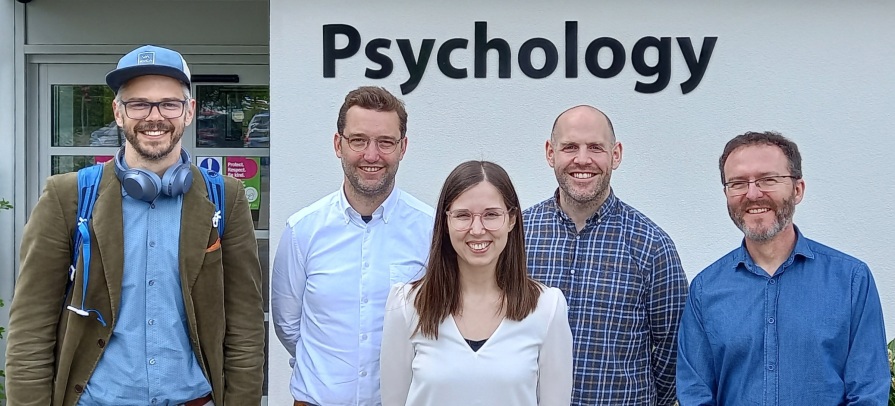Anna á Váli Guttesen vart ph.d. um sambandið ímillum svøvn og minni
Hósdagin 12. mai vardi Anna á Váli Guttesen ph.d.-ritgerð sína í Cognitive Neuroscience and Neuroimaging á Department of Psychology, University of York og tað gekk væl.
Ph.d. verkætlanin snúði seg um at kanna sambandið ímillum svøvn og minni. Heitið á ritgerðini er: "Mechanisms of sleep-associated memory consolidation and next-day learning". Ein grein frá ph.d. ritgerðini er útgivin.
Í metingarnevndini vóru Simon Hanslmayr, professari á Research Institute of Neuroscience and Psychology, University of Glasgow (uttanhýsis metari) og Aidan Horner, ph.d. á Department of Psychology, University of York (innanhýsis metari).
Høvuðsvegleiðari var Scott Cairney, ph.d. á Department of Psychology, University of York, og hjávegleiðari var Gareth Gaskell, professari á Department of Psychology, University of York.
Á myndini frá vinstru: Simon Hanslmayr, Aidan Horner, Anna Guttesen, Scott Cairney og Gareth Gaskell.
Abstract
Sleep is linked to overnight memory consolidation and next-day learning. However, it is unclear which mechanisms of sleep support these memory processes. The Active Systems Consolidation model postulates that during sleep, newly formed hippocampus-dependent memories are reactivated and transformed into stable representations within neocortex. This transformation may, in turn, refresh new learning capacity within hippocampus. With a basis in these assumptions, the present thesis aimed to investigate how sleep facilitates offline consolidation and whether sleep-associated consolidation might contribute to learning the following day. Firstly, a targeted memory reactivation paradigm investigated the oscillatory signatures of reactivation during sleep elicited by verbal and non-verbal memory cues. Increases in theta and spindle power were linked to memory reactivation and stabilization during sleep, and furthermore, verbal cues evoked stronger spindle-mediated memory processes as compared to non-verbal memory cues. Secondly, three experiments investigated the benefits of sleeping before and after learning as compared to staying awake, either overnight or during the day. The results suggested that sleep benefits memory consolidation, and that losing sleep disrupts a neural signature of successful learning, namely, beta desynchrony. However, no benefits of sleeping prior to learning were observed when compared to daytime wakefulness. Addressing the novel hypothesis of a potential relationship between sleep-associated consolidation and next-day learning, three experiments consistently found no evidence to support this hypothesis. Surprisingly, an association was reported between forgetting during daytime wakefulness and subsequent learning of similar materials. Overall, this thesis provides insights into how sleep supports consolidation and raises novel questions about which processes during both sleep and wake may support new memory formation.
